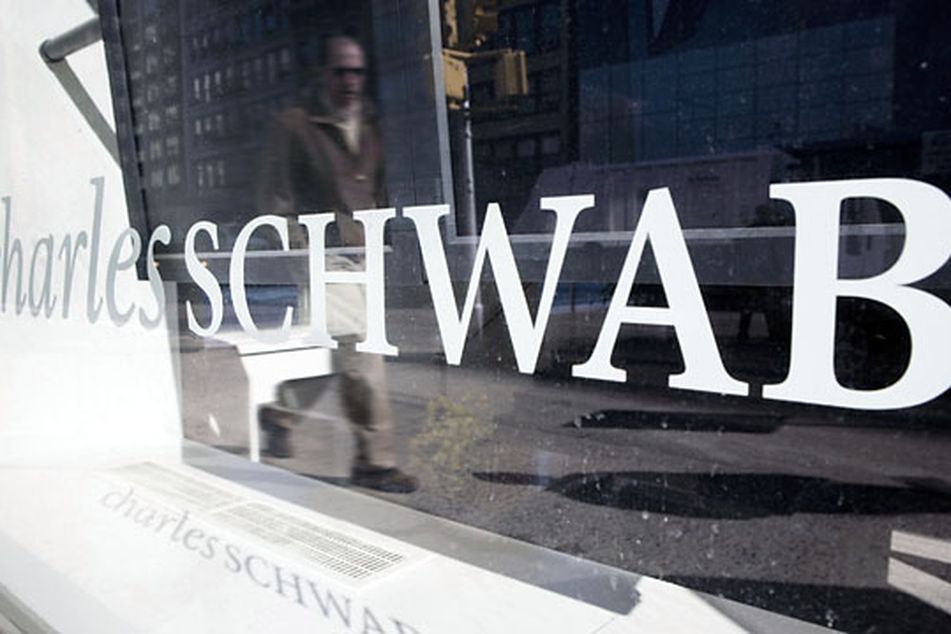Schwab fee change could smack Fidelity, other fund firms

Brokerage plans to charge fund firms by assets on its platform -- not accounts.
Some large mutual fund companies including Fidelity Investments and J.P. Morgan Asset Management might have to shell out more money to stay on The Charles Schwab Corp.’s transaction fee platform.
Starting April 1, Schwab will begin charging funds 10 basis points based on the amount of assets on the platform, instead of the $20 per account that they charge now.
The new prices will benefit firms with a small amount of assets spread out over many accounts. But for larger firms with fewer accounts and sizable assets, it could mean a big increase in costs, said Neil Bathon, founder of Fuse Research.
“Firms with legacy-directed marketed clients probably will wind up paying less because the asset base will probably be smaller, while the firms [that] have focused on the [registered investment adviser] channel may pay more because those are bigger-sized accounts,” he said.
And those higher costs will likely be passed on.
“This is a horrible deal for the fund companies,” said Kevin McDevitt, an analyst at Morningstar Inc. “Ultimately, shareholders pay some portion of those fees.”
Schwab has seen an increase in activity on its transaction-fee platform over the past few months, particularly with institutionally priced shares of funds, said Schwab vice president Doug Hanson, who is in charge of third-party mutual fund relationships. Last year, 58% of fund assets were in transaction-fee funds, up from 47% in 2006.
FEES WERE ‘MISPRICED’
“We started seeing additional flows into those lower-cost institutional shares as well as others on the platform, and it was time to reconcile the costs of servicing the accounts with the fee structure,” Mr. Hanson said. “It was mispriced.”
Schwab hadn’t updated the pricing on the platform since 2003.
The company provides a great deal of support to call centers to serve the platform, such as 24-hour access, Mr. Hanson said. The new pricing structure will help with serving shareholders and other transfer agency functions, such as record keeping, tax reporting and statements, he said.
“For some firms, this is a bigger request than for others,” Mr. Hanson said. “The end investor cost is always a concern, but we need to know that there is appropriate compensation for the services being provided.”
The companies that have the potential to be hit hardest by the new fee structure are Fidelity and J.P. Morgan Asset Management, which have some of the largest number of fund share classes available on the platform.
Fidelity has the most fund classes on the platform, with 247, while The Vanguard Group Inc. is second with 198, and American Funds is in third place with 179. J.P. Morgan is fourth with 126 share classes on the platform.
Vanguard, however, doesn’t pay to be on any platform, including Schwab’s transaction-fee platform and its non-transaction fee platform, OneSource, said Vanguard spokeswoman Rebecca Katz. She declined to comment about how much Vanguard has in assets on the platform.
And American Funds has been paying 10 basis points since the funds went on the platform, said spokesman Chuck Freadhoff.
“This doesn’t appear to be a change in our relationship with Schwab,” he said.
Kristen Chambers, a spokeswoman at J.P. Morgan, declined to comment about how much in assets the firm has on Schwab’s transaction-fee platform or on how the firm would handle the fee increase.
Fidelity spokesman Adam Banker also declined to comment.
Fund company executives’ reactions to the new pricing are mixed.
“Ten basis points is huge,” said an executive at a small fund company who asked not to be identified because his firm has funds on the platform. “The bigger fund companies may have the opportunity to fight this, but we don’t.”
Another executive at a fund company with funds on the platform, who asked not to be identified, said that his firm already pays asset-based fees because its account sizes were so small that it made the most sense economically.
“The impact obviously depends on the firm,” the executive said
Schwab’s new pricing strategy makes sense as a way to protect revenue as more assets go into institutionally priced shares, observers said.
Assets in institutionally priced mutual fund shares jumped to 28.8% last month, from 26.6% in January 2010, according to Morningstar.
“That’s a pretty big move for the mutual fund market,” Mr. McDevitt said.
Institutional classes of shares made up 40% of new fund sales last year, up from 29% in 2005, according to Strategic Insight/Simfund.
With the Securities and Exchange Commission reviewing 12(b)-1 fees and the overall trend of more financial advisers’ moving from commission-based to fee-based businesses, institutionally priced shares are becoming more popular, said Avi Nachmany, director of research at Strategic Insight.
“As more advisers are charging clients a fee for service, they would like to deliver as low a cost as they can on the underlying fund shares,” he said. “The fact that Schwab has moved from a dollar amount to a basis-point amount means that Schwab wants to protect their revenue.”
It will be interesting to see if Schwab’s competitors follow in its footsteps.
Christine Goethe, a spokeswoman at TD Ameritrade Holding Corp., declined to comment about the firm’s pricing.
Fidelity’s fees for funds on its transaction-fee platform are negotiated on a firm-by-firm basis, taking into account the fund firms’ trading relationships and volumes with Fidelity, Mr. Banker said.
“Fee arrangements are firm-specific and may either be per-account fee or a basis-point fee,” he said.
Learn more about reprints and licensing for this article.




